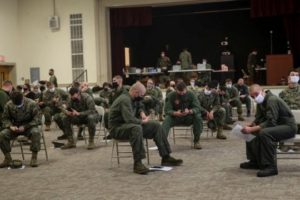
Marines with II Marine Expeditionary Force sit in a waiting area after receiving the COVID-19 vaccine at Camp Lejeune, NC, early last year.
Photo By: Marine Lance Cpl. Samuel Lyd
WASHINGTON — Most active-duty U.S. servicemembers had been vaccinated against COVID-19 by mid-December, when the Army set its deadline.
At the same time, the military services underscored the seriousness of the vaccine mandate by beginning discharges of personnel who refused to comply.
With 98% of soldiers having received at least one dose of the vaccines and 96% being fully vaccinated, the Army relieved six active-duty leaders, including two battalion commanders, and issued 2,767 general officer written reprimands for refusing the vaccination order.
“Vaccinating our soldiers against COVID-19 is first and foremost about Army readiness,” said Secretary of the Army Christine Wormuth. “Thank you to the medical staff who have been supporting the pandemic response at home and to the vaccinated soldiers who put the health and welfare of their fellow soldiers and families first. To those who continue to refuse the vaccine and are not pending a final decision on a medical or administrative exemption, I strongly encourage you to get the vaccine. If not, we will begin involuntary separation proceedings.”
Beginning this month, the Army said that commanders will initiate involuntary separation for the fewer than 1% of active component soldiers—a total of 3,864—who continue to refuse the vaccination order without an approved or pending exemption. Thousands of exemption requests for those seeking medical or administrative exemptions, including religious exemptions, are still being processed.
The Navy also issued guidance to commanders to move forward with administrative separations for sailors who continue to refuse the COVID-19 vaccination.
“In order to ensure a fully vaccinated force, U.S. Navy policy is, first, that all Navy servicemembers receive the vaccine as directed and, second, that any who refuse the vaccine be processed for separation at the earliest possible opportunity,” Vice Adm. John B. Nowell Jr., the chief of naval personnel, announced. “While the vast majority of Navy servicemembers have already received the vaccine, it remains in the interest of the Navy to encourage remaining Navy servicemembers to become fully vaccinated as soon as possible and, at such time, consider them for retention.”
The Navy is offering a path to stay in the Navy for sailors currently refusing the vaccine who miss the deadline but who change their minds. Once they begin the vaccination series, they report their updated vaccination status through their commands to COVID Consolidated Disposition Authority (CCDA). Unless there are extenuating circumstances, administrative separations would be paused or stopped.
Navy personnel with pending COVID-19 vaccination exemption requests will not be processed for separation but are required to begin vaccination within five days of notification that their request has been declined or face discharge.
Nowell said that those who continue refusing would see their administrative separation processing expedited to “maximize speed and equity in achieving a fully vaccinated force,” he said.
As with the Army, the discharges will be honorable unless there are extenuating circumstances, according to military officials.
Other Penalties
The Navy detailed other penalties for refusing vaccination, including that sailors separated based on vaccine refusal will be eligible for involuntary separation pay. It would be even more expensive for officers separated for vaccine refusal but who have not yet completed their service obligation for attending the U.S. Naval Academy or being awarded a Naval Reserve Officer Training Scholarship. They will be required to repay their educational expenses, as will servicemembers who have received advanced education funds.
Media reports also said that more than 100 marines and the Pentagon said that 27 airmen also had been separated because of vaccine refusal. The Marines face the biggest challenges with about 8,000 holdouts, according to news reports.
Pentagon Press Secretary John F. Kirby said a concern about readiness has spurred the military to try to get the “vaccination rate as close to 100% as possible.”
Even with a 98% vaccination rate overall for active-duty servicemembers, he said. a few thousand are still holdouts. “They still have an opportunity to do the right thing for themselves and for their units,” Kirby said. “We obviously hope that they will. But if they don’t, it is a lawful order. And it has to be obeyed, because it is a valid medical readiness requirement.”
While vaccinations mighty be a political issue in society, that is not the case with the U.S. military, the press secretary said, adding, “we’re looking at it from the science, and we’re looking at it from the readiness perspective.”
Vaccine uptake has been considerably slower among reserve and National Guard troops who tend to have later deadlines stretching into the middle of next year.
Several states have balked at the vaccination requirements for National Guard members, and five governors sent a letter last month to Secretary of Defense Lloyd J. Austin III, requesting him to withdraw part of the service secretaries’ directives to National Guard members in their Title 32 duty status concerning the COVID-19 vaccine.
“We acknowledge your right to establish readiness standards for the National Guard for activation into a Title 10 status. However, directives dictating whether training in a Title 32 status can occur, setting punishment requirements for refusing to be COVID-19 vaccinated, and requiring separation from each state National Guard if unvaccinated are beyond your constitutional and statutory authority,” maintained the governors of Wyoming, Alaska, Iowa, Mississippi and Nebraska.
They maintained that legal precedent supports their position.
After Austin rejected a request from Oklahoma for an exception to the National Guard vaccine mandate, Texas Gov. Greg Abbott said he would refuse to enforce the mandate for his state’s National Guard troops.
In response to the Oklahoma request, the Pentagon had said National Guard members who refuse to be vaccinated against COVID-19 would be barred from training and have their pay withheld.

